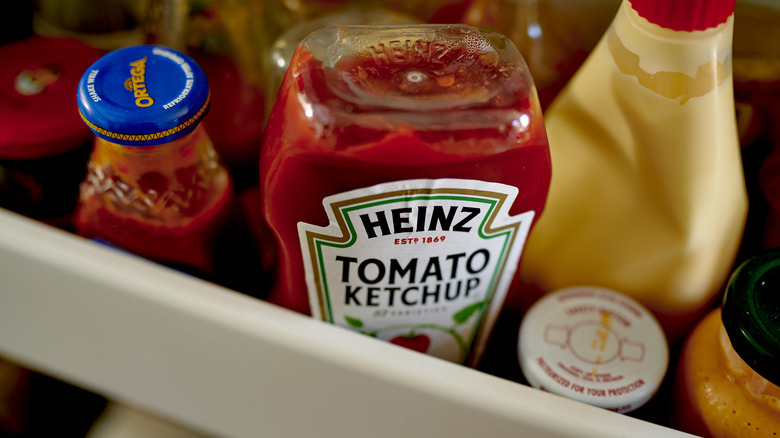Should Ketchup Be Stored In The Refrigerator?
As condiments from around the world have become more accessible and part of cooking in the United States (think gochujang and Kewpie mayonnaise), refrigerators can quickly get to be bursting at the seams. So, it's tempting to find items that can be kept in the cupboard instead. There are many items that should never be kept in the refrigerator, such as cooking oils and raw potatoes, while others like milk have to be kept chilled so they don't spoil. But, where does that leave ketchup, which is often kept out on tabletops and counters at restaurants but stored in the refrigerator at home?
Opinions are mixed on the topic. BBC reported that of 2,600 people polled, 54% said ketchup should be store in the cupboard while the remaining 46% felt it's best kept in the fridge. As food historian Polly Russell pointed out to the BBC, many iconic products like Lea & Perrins Worcestershire Sauce and Heinz Tomato Ketchup were created and first sold before refrigerators even existed in homes.
So, where does that leave ketchup in modern-day homes?
A matter of personal taste
The answer to whether or not ketchup should be kept in the refrigerator is more gray than black and white. The quintessential ketchup maker, Heinz, told Today that its ketchup is shelf-stable because of its natural acidity. However, the international company recommends that opened bottles of the condiment be kept in the refrigerator in order to help maintain the best taste and quality. Eating Well's stance on the topic is that ketchup doesn't need to be refrigerated, but that many people choose to because they prefer the taste of chilled ketchup.
On the other hand, Michael Schulson, founder and CEO of Schulson Collective, told Food & Wine that he doesn't like the taste of ketchup that has been kept in the fridge, saying the taste gets altered.
The bottom line is it is best to keep ketchup in the refrigerator, but it's not required, and depends more on personal preference.

